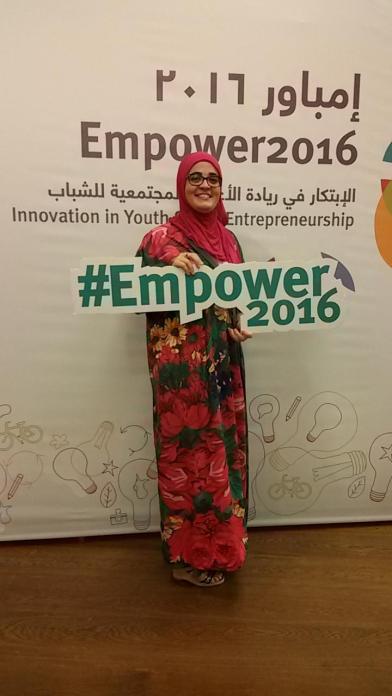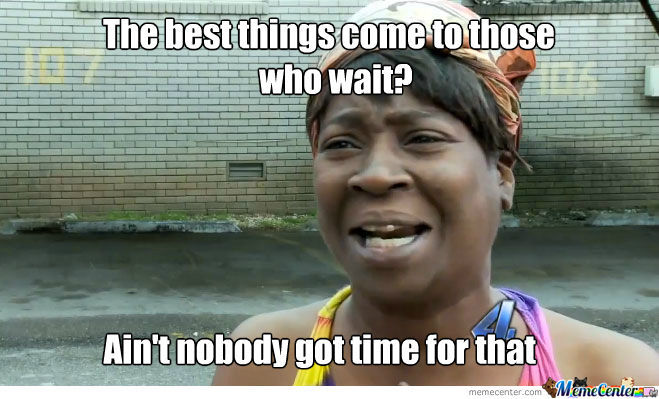I was recently honored to share my views on the topics of entrepreneurship, globalization and gender equality in the MENA region with Polish audiences through a guest blog appearance on Anna  Jadwiga Matelska’s the Random Travel Stories blog. Through her travel blog, Matelska aims to promote the ideas of openness, tolerance and responsible tourism to Polish audiences. When she is not blogging, Matelska is a PR & Marketing Specialist, who is interested in social projects, refugee issues, local communities and cultural diversity. Matelska has a double Masters degree in History and Communication & Journalism and at the moment, the world is calling her, so she is following the call that is taking her all around the world! Originally from Gdansk, Poland, Matelska lived in Kuala Lumpur, Malaysia, for 2 years and now she is currently backpacking around Asia.
Jadwiga Matelska’s the Random Travel Stories blog. Through her travel blog, Matelska aims to promote the ideas of openness, tolerance and responsible tourism to Polish audiences. When she is not blogging, Matelska is a PR & Marketing Specialist, who is interested in social projects, refugee issues, local communities and cultural diversity. Matelska has a double Masters degree in History and Communication & Journalism and at the moment, the world is calling her, so she is following the call that is taking her all around the world! Originally from Gdansk, Poland, Matelska lived in Kuala Lumpur, Malaysia, for 2 years and now she is currently backpacking around Asia.
1) You blog a lot about entrepreneurship in the Arab world, which is a topic that is very exotic for Polish readers, because we don’t really think of the MENA region as a start-up hub. What is the situation like for entrepreneurs in the UAE and other Arab countries? Are the conditions favorable for young entrepreneurs?
According to the Global Entrepreneurship Index 2016, an annual index that measures the health of entrepreneurship ecosystems in 132 countries, the United Arab Emirates (aka U.A.E.) was ranked 19th globally, surpassing countries like Norway, South Korea and Turkey. Furthermore, Dubai SME, an organization that supports the growth of small and medium enterprises (SMEs) in Dubai, estimated that SMEs contribute around 40% to the total value add generated in Dubai’s economy. The U.A.E.’s cosmopolitan environment and entrepreneurs’ ability to access substantial capital, various logistical services, emerging markets and increasingly business friendly regulations, makes the UAE an ideal place for entrepreneurs to set up their startups. However, like any new culture, entrepreneurs in both the U.A.E. and the Arab world are currently facing various obstacles, including a lack of “smart” investment, a mismatch between the region’s educational output and its labor market needs, under-equipped financial systems, a lack of consumer readiness for certain kinds of services and products etc.
2) What are the opportunities and challenges that entrepreneurs/startups face in the MENA region?
According to the ILO, the youth unemployment rate in the Middle East and North Africa in 2014 was 28.2% and 30.5% respectively and 30% percent of the region’s population is between the age of 15 and 29, which represents more than 100 million people. So, in my opinion, not only do we need to promote entrepreneurship to diversify our economies, we also need to promote the establishment of more SMEs to absorb the sizeable population of young unemployed and underemployed people in the Arab world.
Yet, despite all of the aforementioned obstacles, young entrepreneurs across the MENA region are hopeful, and they are continually working on building the legal, financial and cultural infrastructure needed to support MENA-based innovation. If you are interested in learning more about these young dynamc entrepreneurs, can check out the Club Courage segment on my blog, Soukie Speaks.
3) Could you give us 1 or 2 examples of interesting personalities or maybe start-up companies in the Arab world and describe them shortly?
One or two examples? I can give you many! Since there are so many great MENA startups out there, I will pick a couple that I think are interesting and I’ll tell you why:
a) Careem
What is it? Careem is a Dubai-based startup that was founded in 2012 and offer millions of people in the MENA region a ride hailing app. Not only does Careem’s app allow riders to schedule pick ups and to choose what kind of car they are picked up in, it also allows them to track their ride in real time on a map and pay using cash or a credit card. At the momment, Careem is currently operating in 27 cities across the MENA region and it aims to continue to expanding its operations in the future.
Why is it unique? For me, Careem is a true David and Goliath story. Despite the continued investment and expansion of Uber, a U.S.-based rival, in the MENA region, Careem continues to thrive and expand in the Arab world. However, what really sets this startup apart is its commitment to its drivers, also known as Captains. The startup offers its Captains training and aims to continuously improve the Careem experience by listening to their feedback and ideas. Moreover, where possible, Careem also offer its Captains medical insurance and their family members internships to grow their knowledge and skillset.
b) Melltoo Marketplace
What is it? Melltoo is a Dubai-based startup, which was founded in 2014, that provides a mobile app to help people in the U.A.E buy and sell their preloved items. One thing that sets Melltoo apart from other platforms for buying and selling preloved items in the UAE, is that it allows buyers to pay sellers through the app. In addition to providing delivery and money back guarantees for users who have a legitimate claim.
Why is it unique? Not only is Melltoo promoting the idea of sustainable consumption in the Arab world, the startup’s married co-founders, Sharene Lee and Morrad Irsane, are also breaking stereotypes of who and how business is done in the region. Sharene, who wears the niqab, an Islamic garment that covers the face, is Melltoo’s Chief Operating Officer, a mother of 6 and is an active participant in regional startup industry and pitching events.

Full disclosure: I worked for Melltoo Marketplace for 14 months as a Media Relations Coordinator and I loved being part of the Melltoo family.
c) MAGNiTT
What is it? MAGNiTT is Dubai-based online community connecting entrepreneurs and their startups to investors, mentors, and co-founders in the MENA region. Since its official launch in late 2015, the MAGNiTT platform has attracted 1,200 startups, 196 ecosystem institutions and 12 venture capitalists and angel investment groups. In addition to offering users more than 550 tools and 56 services. Just recently, MAGNiTT also added a job posting feature, where entrepreneurs can advertise job and internship vacancies in their startups.
Why is it unique? If you are new to the startup world, finding and connecting with people in the ecosystem can be extremely overwhelming. However, thanks to MAGNiTT’s Founder and CEO, Philip Bahoshy, entrepreneurs in the MENA region now have a user-friendly platform where they can share basic information, social media accounts and video pitches about their startup. The platform also allows entrepreneurs to connect and collaborate with some of the region’s most influential venture capitalists, investors and mentors.
4) On the main page of your blog you say “While saturated job markets, limited government resources and bloated bureaucracies are driving many young people to look for opportunities outside of the Arab world, many young Arabs are choosing to stay and start their own movements and businesses.” Do I understand from this that you think it’s better that young Arabs stay in their home countries and societies rather than go abroad? Do you feel that developing the startup ecosystem further could help improve the situation of young people in the MENA region in any way?
Being half American, half Moroccan, I have always had a foot in two worlds, in both a literal and metaphoric sense. In addition to being the product of a mixed marriage, I am also a Third Culture Kid (TCK), who has spent most of her life traveling. In fact, I boarded my first plane when I was 3 months old to go from Morocco, where I was born, to the U.A.E, where I have lived for a total of almost 20 years.
I have lived in 4 countries (U.A.E., Qatar, U.S.A and Argentina) and I have traveled to more than 20 countries. So, I would never discourage anyone, regardless of where they are from,  to travel and work abroad. If anything, I am always encouraging people to travel and work abroad, so they can learn more about themselves and the beautiful things that the world’s different cultures have teach us. That being so, I don’t think that young Arabs should feel that the only way for the to thrive is to leave their home countries.
to travel and work abroad. If anything, I am always encouraging people to travel and work abroad, so they can learn more about themselves and the beautiful things that the world’s different cultures have teach us. That being so, I don’t think that young Arabs should feel that the only way for the to thrive is to leave their home countries.
Everyone deserves the right to be able to develop and thrive in their own language and context, without having to pay the emotional, social and economic “costs” that can come with being an immigrant worker in a foreign land. Unfortunately, the lack of decent work or decently paid work in many parts of the MENA region, force some of our best and brightest minds to migrate to other countries. Not only does this brain drain have a devastating impact on the development of our societies and economies, it also separates workers from their countries and loved one for months, sometimes years, at a time.
While the reality for blue collar and white collars workers are different, the fact remains that young Arab talent shouldn’t feel compelled to leave their country to thrive. I believe that entrepreneurship will play an instrumental role in combating brain drain in the future, because it will give young Arabs the opportunity to contribute innovative products and services to our communities. Thus, giving them a chance to meaningfully contribute to their personal growth and the economic growth of their respective countries.
5) On my blog I write a lot about cultural diversity from the European perspective for young Europeans. Especially from Eastern Europe because it has many homogeneous societies and it increasingly becoming more and more closed and reserved, especially towards Muslims, who have a lot of negative exposure in the media. Generalization, fear, ignorance are some of the main problems that I try to tackle through my blog. With that in mind, how does it look like from your perspective – i.e. the Arab/Muslim perspective? How are young Arabs and Muslims coping with globalization? How do they perceive other cultures, including Western culture?
Speaking as a well-traveled, educated, Arab-American, polyglot and Muslim woman, I have to say that the recent rise of Islamophobia and xenophobia is truly heart-breaking. However, I know that global media outlets and misguided pseudo-religious organizations are playing a big role in exacerbating this problem. It is important for people to understand that the real issues that are fueling the rise of discriminatory attitudes acr oss the world are often misrepresented or poorly explained.
oss the world are often misrepresented or poorly explained.
In the MENA region, the growing population of people between the ages of 15-29, the lack of decent work and working conditions, the limited integration and participation of youth in civil society and democratic spaces, is leaving millions of people vulnerable to manipulative groups, who are willing to offer young people whatever they want to join their ranks.
That being said, there are also million
s and millions of young, Arabs and Muslims who are working hard to create a better world for themselves, and others, through civil society and impact-driven entrepreneurship and these are the people that I seek to empower and promote through my blog. Millennials across the Arab world are eager to travel, connect and work with anyone who wants to share and exchange their skills with them.
However, unfortunately, these positive role models and agents of change don’t get the spotlight very often. But I hope that the work that me and other global youth are doing can change these negative perceptions. If you are interested in learning more about what me and my talented network are doing, please feel free to connect with me via email at soukainarachidi@gmail.com or through my social media accounts on Twitter, Facebook and Instagram.
6) Gender equality in the Arab world is a big and controversial topic that gets a lot of attention in our media. What are your thoughts on the issue as a young Arab woman? Do you consider yourself a feminist? Have you ever been met with any prejudice or stereotypes towards Arabs/Muslims?
I believe that every person in the world, regardless of their gender, age, nationality or belief system, faces discrimination and challenges that they have to overcome. Unfortunately, the topic of “women’s oppression” in the Arab world has become somewhat fetishized in Western media. Personally, I feel like it’s a space filler when the media is having a slow day. Gender equality is a global issue that varies from culture to culture and country to country.
While Western media outlets would like people to believe that the West is living in an age of post-feminism, one only has to look at the woeful lack of maternity leave in most U.S. work places, the astronomically high rates of bulimia and anorexia in Argentina or the “Ladette” culture in the UK to realize that the struggle for gender equality is still on going and having some very serious repercussions on women worldwide. On the other hand, as a young female millennial in the MENA region, I feel that women across the Arab world are experiencing a cultural and socio-economic renaissance unlike ever before.
What most people don’t understand is that the Arab world is comprised of 22 countries, spanning 13,152,830 sq. km., across two continents. Each country in North Africa, the Horn of Africa, the Gulf and the Levant reflect distinct cultures, especially when it comes to female participation in public and private life. Also, it is imporatnt to note that not all Muslims are Arab and not all Arabs are Muslims, a reality that is considerably changing the “profile” of Muslims and Arabs across the globe.
Unfortunately, there are many people in the world who practice “cultural Islam,” which is a synthesis of local beliefs and religious doctrine. However, it is vital to understand that many of these beliefs are antithetical to Islam’s values, which make them as much as an affront to Islam as they are to secular human rights. To be honest with you, I consider myself a humanist, because I advocate for the right of every person, regardles of their gender, to feel valued, to have meaningful work and to belong to “our global village.”
7) A bit off topic: Ramadhan is just about to finish. For us the concept of the H oly Month is quite difficult to understand, especially the idea of fasting. Somebody told me that you are eating only at night because “Allah cannot see you in the dark” which sounds a bit ridiculous, so obviously I guess this is not the core of it all. Could you explain our readers a little bit about Ramadhan and the main idea behind it?
oly Month is quite difficult to understand, especially the idea of fasting. Somebody told me that you are eating only at night because “Allah cannot see you in the dark” which sounds a bit ridiculous, so obviously I guess this is not the core of it all. Could you explain our readers a little bit about Ramadhan and the main idea behind it?
Fasting is one of the 5 pillars of Islam and it is obligatory during the Holy month of Ramadan, the 9th month of the Islamic calendar. However, voluntary fasting is also encouraged throughout the year.
When fasting in Ramadan, Muslims are required to abstain from all drink and food from dawn to dusk. Muslims are also expected to devote more time to prayer, supplication and the reading of the Holy Quran. Unfortunately, I feel that our modern societies constantly undermine the importance of “feeding” your soul, by making people focus on “feeding” their bodies and their bank accounts. So, I think that it’s great that, once a year, for 29-30 days, Muslims are asked to re-organize their priorities, by focusing on “nourishing” their souls through prayer, good deeds and charity, instead of focusing on their stomachs and their bank balances.
That being said, not everyone is obliged to fast during the Holy month of Ramadan. Pre-pubescent children, pregnant women, mothers who are breastfeeding, women who are menstruating, the elderly, people with medical conditions, people who are ill or traveling are not expected to fast, as it would be a hardship for them.
At the end of the day, I believe that everything in life comes down to an individual’s attitude. So if someone enters Ramadan thinking of it as a month of starvation, that is what they will experience. However, if they view Ramadan as a time to connect with their Creator, their community and themselves, that is what their experience will be. Ultimately, I believe that having the right attitude in life is essential for anyone who wants to benefit from their life experiences, no matter who they are or what they believe.
Like what you see? Join the Soukie Speaks email list and follow my Twitter, Instagram, Facebook accounts, so we can enlighten, support and empower the Arab leaders and entrepreneurs of the future together.
 Photo credit: The Relaxed Photographer
Photo credit: The Relaxed Photographer
 Jadwiga Matelska’s the
Jadwiga Matelska’s the

 to travel and work abroad. If anything, I am always encouraging people to travel and work abroad, so they can learn more about themselves and the beautiful things that the world’s different cultures have teach us. That being so, I don’t think that young Arabs should feel that the only way for the to thrive is to leave their home countries.
to travel and work abroad. If anything, I am always encouraging people to travel and work abroad, so they can learn more about themselves and the beautiful things that the world’s different cultures have teach us. That being so, I don’t think that young Arabs should feel that the only way for the to thrive is to leave their home countries. oss the world are often misrepresented or poorly explained.
oss the world are often misrepresented or poorly explained. oly Month is quite difficult to understand, especially the idea of fasting. Somebody told me that you are eating only at night because “Allah cannot see you in the dark” which sounds a bit ridiculous, so obviously I guess this is not the core of it all. Could you explain our readers a little bit about Ramadhan and the main idea behind it?
oly Month is quite difficult to understand, especially the idea of fasting. Somebody told me that you are eating only at night because “Allah cannot see you in the dark” which sounds a bit ridiculous, so obviously I guess this is not the core of it all. Could you explain our readers a little bit about Ramadhan and the main idea behind it? 









 startup’s “persona” is heavily dependent on the personality of its founder. So, whatever strengths or weaknesses you have as an individual will inevitably be reflected in your startup in some way shape or form. Seeing as most startups have small teams with tight budgets, they don’t have the luxury of outsourcing your “weaknesses” to another department. Consequently, it is imperative for startup leaders to know themselves if they want to be successful.
startup’s “persona” is heavily dependent on the personality of its founder. So, whatever strengths or weaknesses you have as an individual will inevitably be reflected in your startup in some way shape or form. Seeing as most startups have small teams with tight budgets, they don’t have the luxury of outsourcing your “weaknesses” to another department. Consequently, it is imperative for startup leaders to know themselves if they want to be successful.




